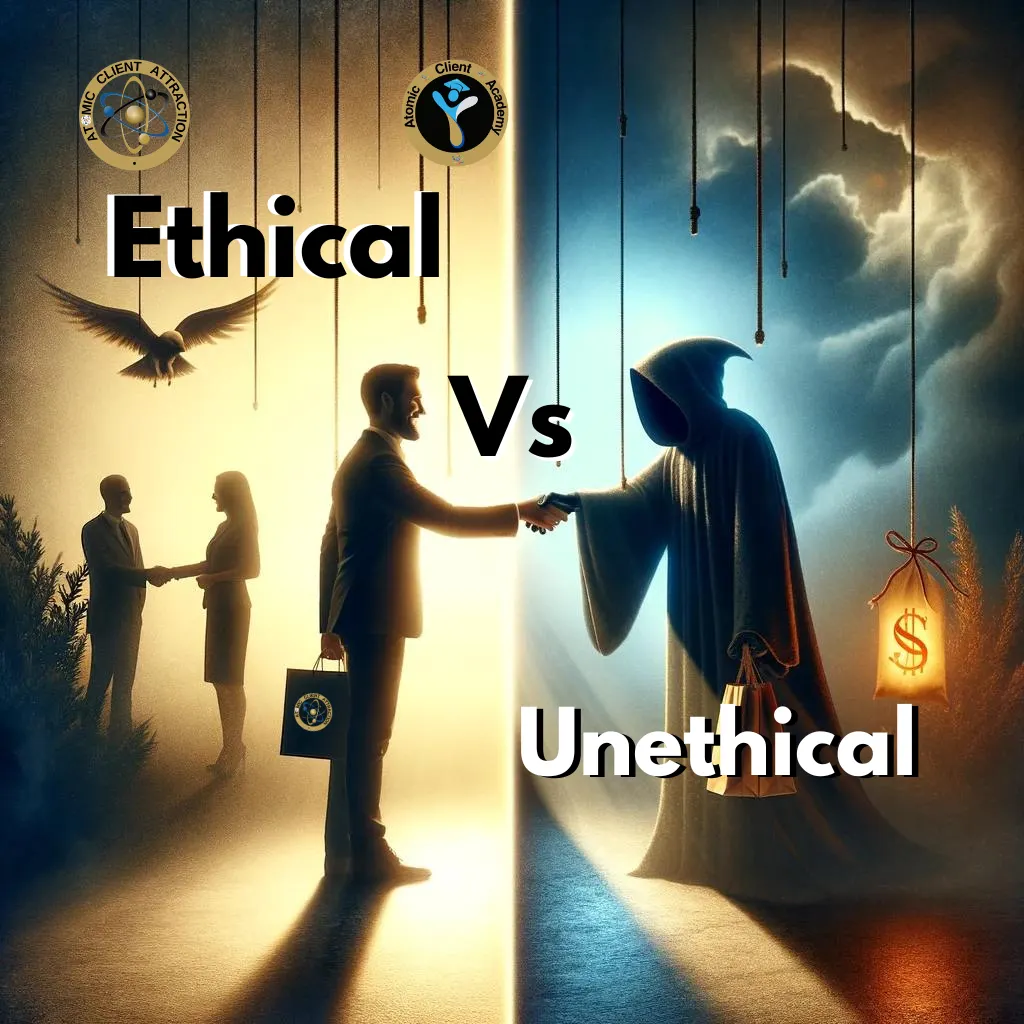Exploring Ethical and Unethical Practises.
A Vital Conversation,
The Fine Line in Sales
One aspect that remains perpetually relevant is the approach to selling.
In this blog, we delve into the concepts of ethical and unethical selling, shedding light on their implications, and unravelling the complexities behind each practice.

The mindset for Therapists and coaching over sales is complex and deep rooted. I don't want to come across as salesy, but I need to create an income is part of it. Another part is if it feels unethical.
Ethical Selling - The Road Less Travelled
Ethical selling is grounded in honesty, integrity, and a deep regard for the customer’s needs.
It's about forging lasting relationships rather than just chasing sales. Something that is at the core of my business and takes front and centre for Atomic Client Attraction.
In the big wide world Patagonia, for example, a brand synonymous with environmental sustainability, which often encourages customers to repair rather than replace their products.
This not only builds immense brand loyalty but also sets a high standard for ethical practices in business.
But what makes ethical selling beneficial?
The answer lies in its long-term gains – customer loyalty, brand reputation, and reduced legal risks.
Customers today are increasingly conscious of their purchasing choices and tend to favour businesses that align with their values.
However, ethical selling is not without its challenges.
It often requires more significant initial investments and a strong commitment to transparency, which may sometimes result in short-term losses.
For instance, acknowledging a competitor's product superiority can cost a sale but gains long-term trust.

The Dark Side
Unethical Selling Practices
In contrast, unethical selling is characterized by deceit and manipulation.
Unfortunately, many of you reading this, including myself writing this have fallen foul of this method.
Again, in the wider world you might have heard of,
The Volkswagen emissions scandal, for instance, where the company falsely marketed their cars as eco-friendly, serves as a stark reminder of the perils of unethical practices.
This not only led to legal repercussions but also tarnished their reputation.

In the competitive world of sales, the pressure to close deals can sometimes lead to the adoption of aggressive or heavy-handed closing techniques, a practice that raises serious ethical concerns.
These techniques, often referred to as "hard selling," involve high-pressure tactics that can border on manipulation, leaving the customer feeling cornered or coerced into making a decision.
Moreover, the unethical use of heavy closing techniques can have broader implications beyond individual transactions. It can tarnish a company's reputation, erode trust in the sales profession, and contribute to a negative perception of the sales process as a whole.
In today's world, where consumer awareness and advocacy are on the rise, such practices are increasingly being called out and penalized, both by consumers and regulatory bodies.
The immediate allure of unethical selling is often rooted in its potential for quick financial gains and market domination.
However, these short-term victories come with a hefty price tag – legal issues, brand damage, and loss of customer trust.
The Conundrum - Choosing Between Right and Wrong

Navigating the ethical landscape in sales can sometimes be tricky.
Marketing tactics like creating a sense of urgency or scarcity, while common, pose ethical dilemmas.
It’s crucial for businesses to find a balance between persuasive selling and maintaining ethical integrity.
Again, this is a grey area in the sense if there is genuine scarcity falls into the ethical camp.
My signature programme has a maximum of 4 people per programme. Once full, that’s it! Ethical yes because it is true!
It is when it is not true and people are given incorrect information that pressurises them in buying, it becomes unethical!
Taking the Ethical Path Forward
Embracing ethical selling practices might seem daunting, but its long-term benefits cannot be overstated.
It fosters trust, secures loyalty, and builds a positive brand image – all essential ingredients for sustainable success.
On the other hand, the pitfalls of unethical selling, though tempting, can lead to irreversible damage to both reputation and finances.
In Summary
Ethical selling isn't merely about avoiding negative practices; it's about proactively doing what's right, both for the customers and the broader society.
In a world where consumers are increasingly valuing transparency and integrity, ethical selling becomes not just a moral choice, but a business imperative.
Remember, the choices we make in how we sell not only define our business success but also the kind of impact we have on the world. Let’s strive to be on the right side of this fine line.
Thank you for joining us in exploring the nuances of ethical and unethical selling.

